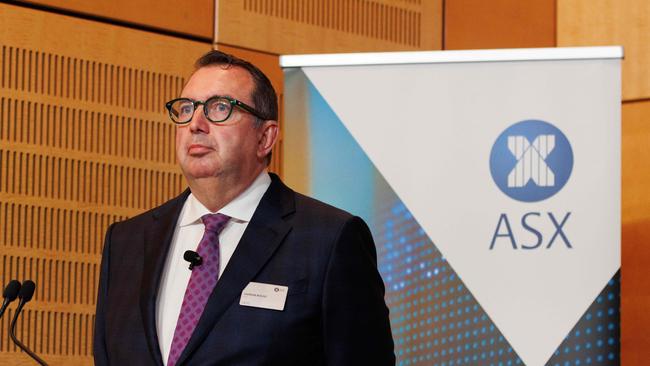ASX strike needs to be turning point for sorry exchange
The exchange operator must fundamentally change if it wants to stay relevant. Hopefully this upheaval is the start.

SA Business
Don't miss out on the headlines from SA Business. Followed categories will be added to My News.
A shareholder strike is a strike, no matter how it is measured.
However, the surprise is the Australian Securities Exchange didn’t get a bigger rejection of its remuneration report, particularly after taking into account a very ordinary year from the exchange operator where trust took a beating.
In the month when the broader share market hit record highs, ASX ranks as one of the laggards among the global stock exchanges. So far this year its shares are up 7 per cent, missing out on the 22 per cent average increase among exchanges around the world.
It’s performed better than Warsaw stock exchange (up 2 per cent) and Dubai stock exchange (down 7.1 per cent), but has missed out on double-digit gains of the likes of Nasdaq, London, Hong Kong and Singapore. Even New Zealand, in the land of high interest rates, the exchange post gains of more than 27 per cent this year.
Outgoing ASX chair Damian Roche has finished up, leaving the exchange operator with a number of dubious firsts.

The exchange secured a historic shareholder strike against its remuneration report, pulling a vote of just over 25 per cent. Last year it was close to a strike of 21 per cent.
The replacement of ASX core settlement and clearing platform (CHESS) has been a debacle from beginning through to the $250m cost of shelving the project. Roche wasn’t in charge at the beginning, but he took charge as chairman a year before the project went off the rails.
Finally the exchange is subject to landmark legal action for allegedly misleading investors over progress, or lack of progress in the CHESS replacement. The ASX is reviewing the civil claim and is yet to file a defence.
Each of these three issues represent a hit to ASX’s integrity to operate. And then there’s lagging share price performance. The ASX delivered record revenues last year by return on equity.
The ASX under new chairman, the former BT boss, one-time Allco chief and current Charter Hall chair David Clarke, has one year to win back the trust of its investors and potentially less time to convince regulators and potentially the Treasurer to minimise the impact of competition across its clearing and settlement business. It’s a big job for Clarke and he needs to move fast.
ASIC is expected to release feedback from a consultation paper looking at the impact of competition in coming weeks. This will provide the clearest guide yet of how the new rules will look.

Clarke has the benefit of a new CEO, Helen Lofthouse, who has done much of the heavy lifting in winning back trust while the board was setting it back. Now Lofthouse should be given all support to bring the ASX back into the modern age without breaking the bank.
Even so, ASX is going to be a high-cost business for the foreseeable future as it spends more on technology. Capex spending is expected to remain at between $160m and $180m until financial 2027 and then start to fall away. Before the CHESS replacement program went off the rails capex was averaging around $110m a year. This suggests the ASX is paying a premium for delivery rather than risking any more cutting-edge technology.
On his exit Roche told the ASX annual meeting he remains proud of his time at the ASX: “Where we’ve had issues we’ve acknowledged (them), we’ve addressed them, we’ve been very transparent about how we’re going to go about fixing them, and I have every confidence in David (Clarke) and the board and Helen and the leadership team moving forward.”
It’s now with almost an entirely new boardroom – that includes the recent addition of former bank regulator Wayne Byres as a director – along with a new management team, ASX can really move forward.
Founder led fortunes
WiseTech shares briefly surged when founder Richard White declared he was immediately stepping down as chief executive. The billionaire’s exit – on paper at least – was the circuit-breaker sorely needed for the tech company as drama and allegations were building over White’s private life.
But what’s the longer-term outlook for WiseTech? Or even Mineral Resources, which is another troubled founder company, if Chris Ellison steps down?

A sweep by brokerage Macquarie on the performance of companies following the exit of founder from a management or operational role shows that in general the share price underperformed up to a year after the exit.
Granted, the pool of large companies is not large with just four under the microscope – Computershare, Fortescue, Seek and Xero. In all of these the founder stayed involved in the company in some way, by remaining on the board or transitioning to a chairman.
Of these, only Xero – an accounting software specialist – outperformed in the year after the retirement of founder Rod Drury. In that case it was a smooth transition from Drury as he handed over to a highly experienced chief executive, Steve Vamos. From there, Xero went from strength to strength, delivering excess returns of more than 50 per cent in the 12 months after the announcement.
For Computershare, Fortescue and Seek it wasn’t so easy. All underperformed in the immediate aftermath of the announcement, and the falls accelerated over a six-month and 12-month period. It’s worth noting that in each case it was a smooth transition.
Even for miner Fortescue, which in recent years has had rapid management turnover, the transition in 2011 from Andrew Forrest to Nev Power as CEO set the miner up for years of management stability.
While Magellan wasn’t part of the Macquarie study, not only was there a share-price slide following the exit of co-founder Hamish Douglass, it also coincided with billions of dollars in funds being pulled from the asset manager.
And this goes to the second finding from Macquarie; it’s far better for the share price when companies promote from within compared with looking outside.
Both National Australia Bank and Westpac have recently named their new chief executives from inside their ranks.
Looking at nearly 150 executive transitions across the ASX, Macquarie found internal hiring showed a slight underperformance following the announcement and then a rebound the next year.
The medium excess return for external hires is minus 6 per cent in the six months following the announcement. This shouldn’t be a surprise as externals usually bring a new strategy and this comes with plenty of management disruption.

For WiseTech and possibly MinRes there could be more management instability to follow.
Richard White’s exit last week showed the $40bn company had no clear succession strategy in place. Chief financial officer Andrew Cartledge has delayed his planned retirement to stay on as acting chief executive. The WiseTech board, led by Richard Dammery, has begun a global search looking for White’s replacement. In time, Cartledge still plans to retire, which means more change is coming to the executive ranks.
WiseTech surged as much as 20 per cent on last Thursday’s resignation note, however the shares have since drifted back slightly to be up 12 per cent. There are still questions over how White’s future long-term role as a consultant will be handled.
Elsewhere, iron ore-to-lithium miner MinRes is under pressure as its board reviews historical payments and the business affairs of founder Chris Ellison.
The Australian earlier Monday reported MinRes is working on a crisis succession plan to replace Ellison as managing director, although a number of big investors want him to stay.
For both WiseTech and MinRes, while the odds are stacked against them the moment of transition could still represent a turning point. Xero has shown the way when a high-velocity company with the right chief executive can move to the next level. But that’s as long as the relationship with the founder can be managed.
johnstone@theaustralian.com.au
Originally published as ASX strike needs to be turning point for sorry exchange



